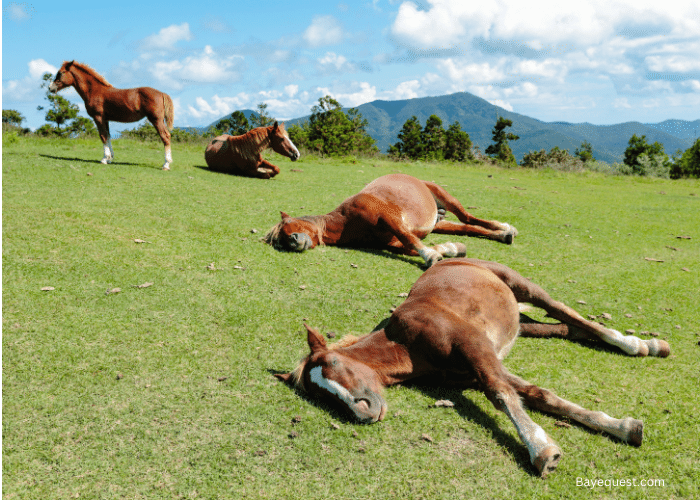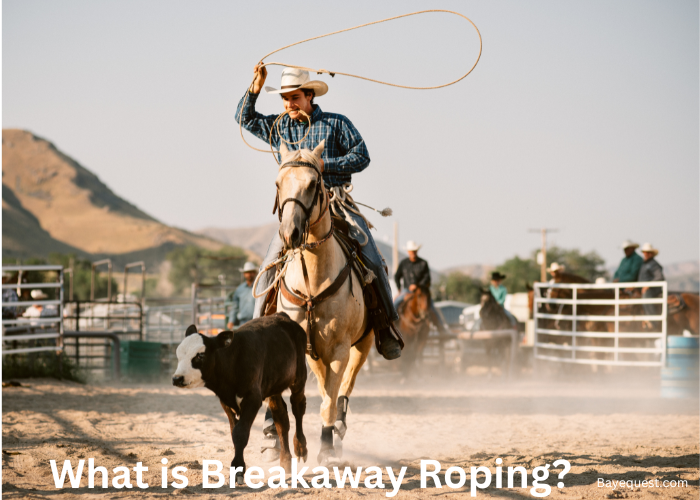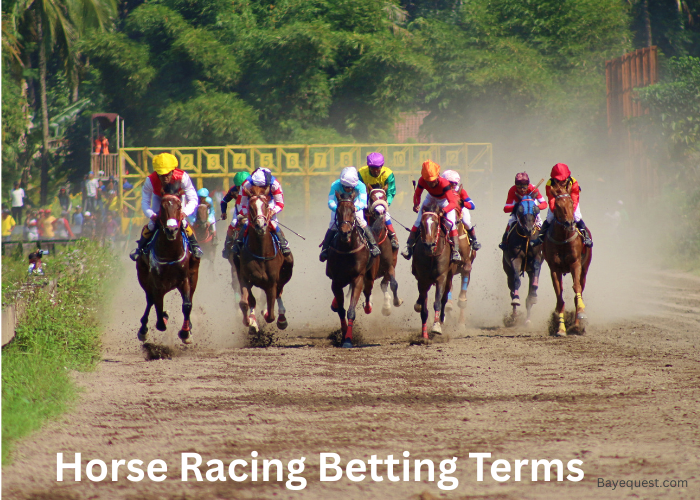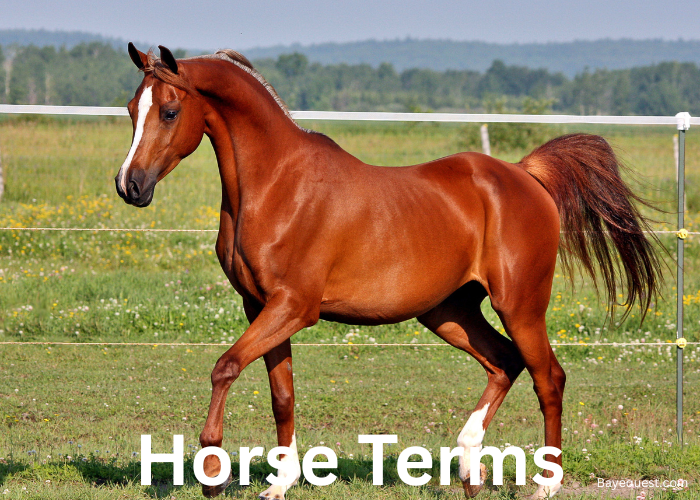Have you ever wondered how horses catch their z’s? Unlike us, horses have a unique way of snoozing that might surprise you. They can sleep both standing up and lying down.
Yes, you heard right — standing up. This curious behavior isn’t just a quirky trait; it’s essential for their survival.
In this blog, we’ll dive into the fascinating world of horse sleep. From their different sleeping postures to the intriguing phases of their sleep cycle. Get ready to discover how these majestic creatures rest and recharge.
Whether you’re a horse lover or just curious about animal behavior, there’s something here for everyone. Let’s explore the secret sleep life of horses.
How Do Horses Sleep?
Horses have a distinctive sleeping pattern, adapted to their needs as prey animals in the wild. They can sleep standing up or lying down, utilizing light and deep sleep throughout the day and night.
Here’s how it works:
Standing up
Standing sleep in horses is pretty clever. It’s all thanks to something called the “stay apparatus.”
This unique setup in their legs lets them lock their joints in place, allowing them to relax their muscles and doze off without falling over.
This light sleep helps them stay ready. They can wake up and move quickly if there’s any danger around. It’s a great survival trick for staying safe while catching some z’s.
This kind of sleep isn’t deep, but it does the job, especially when they need to stay alert.
Horses engage in standing sleep for short periods throughout the day and night, often in bursts of a few minutes to half an hour at a time. Over a 24-hour period, they might accumulate several hours of this light, standing sleep.
The exact amount can vary based on the horse’s age, environment, and individual needs.
Lying down
When horses sleep lying down, they’re going into a deeper sleep. This is the kind where they can rest up and hit that REM sleep—the kind that’s refreshing.
They usually lie in a safe, comfy spot where they feel secure because getting that deep sleep makes them more vulnerable to predators. Horses won’t lie down for long—usually just for short spells here and there throughout the day, adding up to a few hours in total.
When they lie down, it’s a sign that they feel safe in their environment and with the other horses around them.
Four Stages of Sleep
Awake
This is the fully alert stage, during which the horse is conscious and aware of its surroundings. Horses spend much of their time in this state, ready to react to any changes or potential environmental threats.
Dozing
In this stage, horses are in a light sleep that allows for quick wakefulness if needed. While dozing, horses often stand with their feet locked by the stay apparatus, which supports them without needing muscular effort.
Their eyes might be half-closed, and they can easily slip back to full alertness. Dozing can occur frequently throughout the day in short intervals.
Slow wave sleep (SWS)
During slow wave sleep, horses usually lie down, although they can sometimes achieve this state while standing. This stage of sleep is deeper than dozing and is crucial for brain health and physical recovery.
However, they are not yet in the deepest sleep phase, so they maintain some level of awareness and can wake up relatively quickly if disturbed.
Rapid Eye Movement Sleep (REM)
For REM sleep, horses must lie down, often on their side. In this stage of sleep, their muscles are completely relaxed and paralyzed, which prevents them from standing.
REM sleep is essential for processing memories, learning, and mental restoration. Horses spend a little time in REM sleep, usually only a few minutes at a time, but it’s vital for their overall well-being.
They need a safe, comfortable environment to achieve this state, as they are fully relaxed and vulnerable during this stage.
How Long Do Horses Sleep?
Horses don’t sleep like we do. They grab their sleep in short bursts instead of all at once.
Over a whole day, they might get about three hours of sleep. This isn’t in one go, though. They break it up into smaller bits—maybe a few minutes here and a half hour there.
Most of this sleep happens in lighter stages, especially when they’re standing up. For that deep, really good REM sleep, where they’re fully resting, they need to lie down, and that’s even shorter.
They might do this in quick spells, adding up to just a bit of their total sleep time. So, horses are pretty light sleepers overall, always ready to be on the move if they need to.
Factors Influencing Horse Sleep
Several things can affect how well a horse sleeps. Let’s look at some of them:
Safety. Horses need to feel secure in their environment. If they sense any threat or are in unfamiliar surroundings, they might not lie down to sleep. Feeling safe is crucial for them to relax enough to enter deep sleep stages.
Comfort. The comfort of their resting area significantly affects their sleep. Horses need a soft, dry place to lie down. If the bedding isn’t comfortable or the ground is too hard or wet, they are less likely to get quality REM sleep.
Social environment. Horses are herd animals and rely on the presence of others to feel secure. A horse alone might be more alert and anxious, reducing overall sleep quality. They sleep better knowing other members of the herd are around to alert them to potential dangers.
Health. A horse’s health directly impacts its sleep. Issues like pain, illness, or discomfort can prevent a horse from lying down and achieving deep sleep. Maintaining good health through regular veterinary care and proper diet is essential for their sleep quality.
Routine. Horses thrive on a consistent routine. A regular schedule for feeding and exercise.
Common Sleep Disorders in Horses
Horses, like humans, can experience various sleep disorders that affect their rest and overall health. Here are some common sleep disorders in horses:
Sleep deprivation. This occurs when a horse doesn’t get enough sleep over a period of time. It can lead to noticeable signs of fatigue, such as stumbling or even collapsing.
Narcolepsy. Although rare in horses, narcolepsy causes sudden and brief episodes of sleep, where a horse might collapse while its muscles relax. This disorder is generally considered genetic and is not induced by external factors.
Sleep apnea. Sleep apnea can occur in overweight or respiratory-infected horses. It involves interruptions in breathing during sleep, which can cause the horse to wake frequently.
Restless leg syndrome. Similar to humans, horses may experience involuntary leg movements during sleep. This condition isn’t well-documented in horses but is observed by some caretakers.
REM sleep behavior disorder. This is when horses physically act out their dreams during REM sleep, which can be dangerous if they injure themselves or others around them. Although rare, it can be concerning when observed.
Signs of Sleep Deprivation in Horses
If a horse isn’t getting enough sleep, there are some clear signs you can look out for:
Irritability. Just like people, a tired horse can be grumpy. They might be more reactive or sensitive than usual, showing signs of annoyance or discomfort.
Lack of energy. A horse suffering from sleep deprivation might seem unusually tired or lethargic. They may not have their usual pep or seem disinterested in activities they normally enjoy.
Frequent yawning. Keep an eye out for more yawning than usual. It’s a sign they’re trying to shake off the tiredness and stay awake.
Poor performance. You might notice a drop in their performance levels if the horse is used for riding or work. They could have trouble concentrating or following commands they know well.
Stumbling or collapsing. This is one of the more serious signs. If a horse is short on sleep, they might collapse or fail to keep themselves steady, especially during moments of relaxation.
Causes of Sleep Deprivation
Sleep deprivation in horses can result from various factors impacting their ability to rest well. Here are some of the common causes:
Uncomfortable environment. If the bedding is hard, wet, or inadequate, horses may not lie down to enter REM sleep, which is crucial for complete rest. Excessive noise or light can disrupt their sleep patterns.
Pain or illness. Horses experiencing discomfort from injuries, arthritis, or other health issues may find lying down or falling asleep difficult. Pain can significantly interrupt their sleep, leading to sleep deprivation.
Stress or anxiety. Like humans, horses can suffer from stress or anxiety, which can keep them from relaxing enough to sleep well. Changes in their environment, such as new stables or changes in the herd, can contribute to this anxiety.
Poor diet. Nutrition plays a crucial role in sleep quality. Deficiencies in certain nutrients or a diet that causes gastrointestinal discomfort can impact a horse’s ability to sleep.
Lack of Routine. Horses thrive on routine, and disruptions to their daily schedule can lead to sleep issues. Inconsistent feeding times, exercise, or stable management can prevent them from settling into a healthy sleep pattern.
Inadequate social interaction. Horses are herd animals and often rely on the presence of others to feel secure enough to sleep deeply. Isolation can lead to increased vigilance and reduced sleep.
Tips for Promoting Good Sleep in Horses
To help horses get better sleep, do the following:
Create a safe space. Make sure the stable or pasture is safe and secure. Horses need to feel protected from threats, and a calm, quiet environment helps a lot.
Provide comfortable bedding. Lay down plenty of soft, dry bedding. Whether it’s shavings, straw, or another material, comfort is key to helping them lie down for those deep sleep periods.
Keep a routine. Horses like predictability. Stick to a regular schedule for feeding, exercise, and bedtime. This helps them relax because they know what to expect.
Ensure social interaction. Since horses are herd animals, they sleep better when they’re not alone. Keeping horses together helps them feel secure enough to sleep deeply.
Monitor health. Regular check-ups with a vet can catch health issues before they become serious. A healthy horse is more likely to sleep well.
Manage noise and light. Try to minimize unexpected noises and keep lighting natural or gentle. Too much artificial light or loud sounds can disrupt their natural sleep cycles.
What if a Horse Doesn’t Sleep a Lot?
It can be a bit concerning if a horse doesn’t sleep much. Over time, lack of sleep can wear them down. Here’s what happens if a horse isn’t getting enough rest:
First off, they might seem tired or sluggish. You might notice them having less energy than usual or not being as active.
They could also start acting a bit off, maybe a little irritable or jumpy, because, just like us, a tired horse can get grumpy.
Their overall health might also suffer. Horses need good sleep to help their bodies and minds recover from the day.
Without it, they can’t perform their best, whether that’s during training, competition, or just everyday activities.
In serious cases, a horse that’s really lacking sleep might even have trouble standing up properly. They could stumble or even collapse if they’re really sleep-deprived. This is pretty rare, but it’s something to watch out for.
So, if a horse isn’t sleeping much, it’s important to figure out why. It could be their environment, health, or stress causing the problem.
Once you know what’s up, you can help fix it and get them back to snoozing properly.
Do Horses Sleep with Their Eyes Open?
Yes, horses can sleep with their eyes open. It might seem odd to us, but it’s another way they stay alert to what’s happening around them.
When a horse dozes off standing up, they often keep their eyes partially or fully open. This lets them quickly wake up and respond if they sense danger or something unusual in their environment.
So, when you see a horse standing still with its eyes open, it might actually be catching a quick nap.
This light sleep, while standing and possibly with eyes open, helps them stay ready to spring into action at a moment’s notice.
Do Horses Dream?
Yes, horses do dream. When they reach the stage of sleep known as REM, which stands for Rapid Eye Movement, that’s when dreaming happens.
During this deep sleep phase, a horse’s brain is quite active, almost like when awake. Although we can’t know exactly what they dream about, their legs or eyes might twitch under their eyelids.
This happens when they’re lying down and in a deep sleep, so if you ever see a horse stretched out and looking relaxed, there’s a good chance it might be in dreamland.
Interesting read: Do Horses Vomit?
Where do Horses Sleep?
Horses can sleep in various places, depending on where they’re most comfortable and what’s available.
If they’re in the wild, they’ll often choose a quiet, secluded spot where they feel safe from predators.
This could be a clear, flat area where they can see around easily. (Find out how a horse sees in our comprehensive guide.)
For domestic horses, it’s a bit different. They usually sleep in a stable or barn, which provides shelter and security.
Inside, they have their own stall with bedding—usually straw or shavings—that’s kept clean and dry. This makes a cozy spot for them to lie down for deeper sleep.
Some horses also sleep outdoors in a paddock or pasture. If they’re outside, they might choose a spot with natural shelter, such as trees or bushes.
Whether inside or out, horses need a safe spot where they can relax enough to drift into both light and deep sleep phases.
Related read: What is a Cast Horse?
Conclusion
As we’ve journeyed through the unique world of horses’ sleeping, it’s clear they have their own special ways of catching some Zs. From standing dozes to deep, dreamy slumbers, horses tailor their rest to stay safe and rejuvenated.
Whether in a cozy stall or a peaceful pasture, understanding their sleep habits helps ensure they’re happy, healthy, and well-rested. So next time you see a horse, remember they might be grabbing a quick nap right before your eyes.
Let’s give our equine friends the comfort and care they deserve to sleep soundly.
What next? Check out our guide on meaning of horse dreams to uncover their hidden messages and how they can inspire your life.








